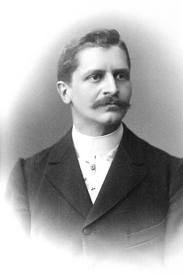Jules Lachelier
You can help expand this article with text translated from the corresponding article in French. (January 2025) Click [show] for important translation instructions.
|
Jules Lachelier | |
|---|---|
 | |
| Born | Jules Esprit Nicolas Lachelier 27 May 1832 |
| Died | 26 January 1918 (aged 85) |
| Awards | Concours général (1850) Chevalier de la Légion d'honneur (1872) Officier de la Légion d'honneur (1888) Commandeur de la Légion d'honneur (1903) |
| Era | 20th-century philosophy |
| Region | Western philosophy |
| School | French spiritualism (neo-spiritualism)[1][2] Lebensphilosophie (French school)[3] |
Jules Esprit Nicolas Lachelier (27 May 1832 - 26 January 1918) was a French philosopher, most known for his contributions to French idealism and his influence on modern French philosophy. He developed a system of rational idealism and was a key figure in the neospiritualist movement in French philosophy.[4][5]
His work focused on the relationship between thought and reality, and he attempted to provide a basis for induction in a philosophy of nature. Lachelier's ideas had a significant impact on other philosophers, including Émile Boutroux, Victor Brochard, and Henri Bergson.[6]
Philosophy
[edit]Defining himself as an intellectualist, Lachelier set himself the mission of perpetuating the philosophy of Kant. One of his famous articles, Psychologie et Métaphysique, distinguishes him from Victor Cousin, and lays the foundations of his spiritualist-leaning philosophy.[7]
Lachelier is influenced by Félix Ravaisson, from whom he borrowed the term "spiritual realism" to designate his philosophy. Henri Bergson dedicates his Time and Free Will to Jules Lachelier.[8] Émile Meyerson discusses his theory of induction.[9]
Works
[edit]- Du fondement de l'induction suivi de Psychologie et Métaphysique, Alcan, 1896, in Gallica.
- Du fondement de l'induction suivi de Psychologie et Métaphysique et de Notes sur le pari de Pascal, Paris, Alcan, 1924.
- Œuvres, Paris, Librairie Félix Alcan, 1933
References
[edit]- ^ Iannone, A. Pablo (2013). Dictionary of World Philosophy. Taylor & Francis. ISBN 9781134680436. Retrieved January 5, 2025.
A particular form of spiritualism, frequently called neo-spiritualism, is that formulated by the French philosopher Jules Lachelier (CE 1834-1918), who was the teacher of the French philosophers Emile Boutroux (CE 1845-1921) and Henri Bergson (CE 1859-1941), both of whom are often also considered to exemplify neo- spiritualism. Lachelier advocated a form of spiritual realism whereby the spirit and spontaneity of humans provided an alternative to both idealism and materialism.
- ^ Dupont, Christian (2013). Phenomenology in French Philosophy: Early Encounters. Springer Netherlands. p. 33. ISBN 9789400746411. Retrieved January 5, 2025.
- ^ Gordon, Peter E.; Breckman, Warren, eds. (August 29, 2019). The Cambridge History of Modern European Thought: Volume 2, The Twentieth Century. Cambridge University Press. p. 157. ISBN 9781107097780.
- ^ Ballard, Edward G. (1955). "Jules Lachelier's Idealism". The Review of Metaphysics. 8 (4): 685–705. ISSN 0034-6632. JSTOR 20123476.
- ^ Ballard, Edward G. (1960). The philosophy of Jules Lachelier. doi:10.1007/978-94-011-9522-5. ISBN 978-94-011-8699-5.
- ^ Bachman, Jessica. "Bergson, Henri". Oxford University Press. Retrieved 2024-11-07.
- ^ Lachelier, Jules (1832-1918) Auteur du texte (1896). Du fondement de l'induction ; suivi de : Psychologie et métaphysique (2e édition) / par J. Lachelier,...
{{cite book}}: CS1 maint: numeric names: authors list (link) - ^ "Henri Bergon: Time and Free Will: Table of Contents". brocku.ca. Retrieved 2024-11-07.
- ^ Meyerson, Émile; Fruteau de Laclos, Frédéric (2011). Du cheminement de la pensée. Bibliothèque des textes philosophiques. Paris: J. Vrin. ISBN 978-2-7116-2186-6.
